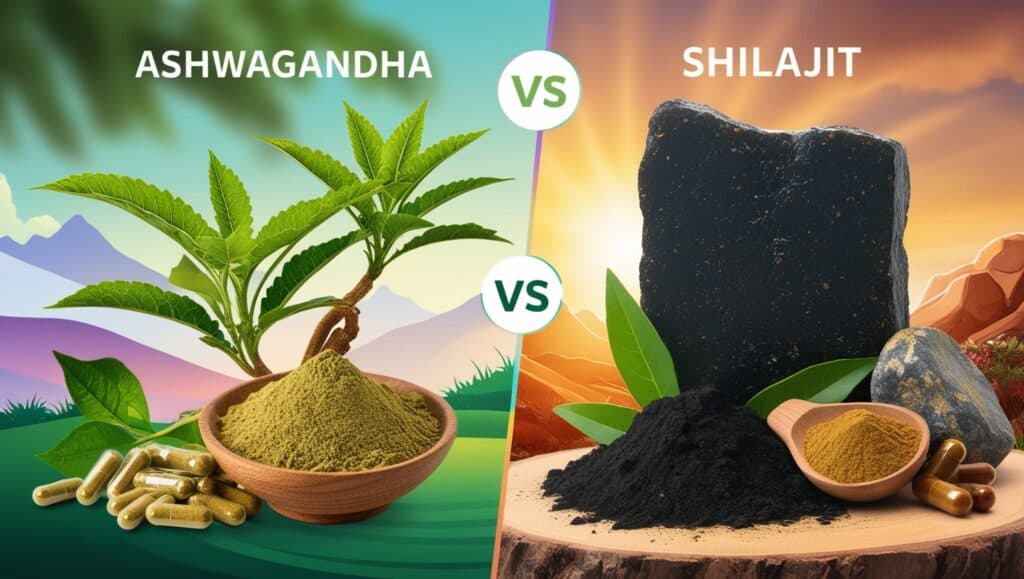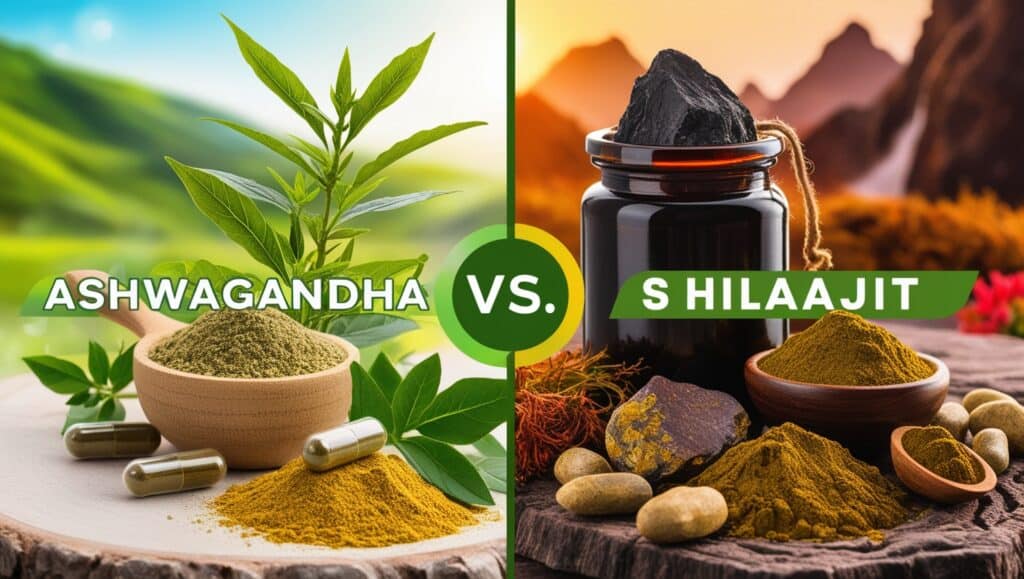
Ashwagandha: A natural adaptogen known for reducing stress and enhancing relaxation.
Ashwagandha Vs Shilajit For Stress Relief
When it comes to managing stress, the natural benefits of herbal supplements are gaining popularity.
Two notable contenders in the world of adaptogens are ashwagandha and shilajit.
Both substances are rooted in ancient herbalism but have unique properties and benefits that may cater to your specific needs for stress relief.
Understanding Ashwagandha
Ashwagandha, also known as Withania somnifera, is a powerhouse herb often used in Ayurvedic medicine.
It’s classified as an adaptogen, meaning it helps the body manage stress and restore balance.
This plant is particularly known for:
- Reducing cortisol levels: High cortisol, the stress hormone, can lead to various health issues. Studies suggest that ashwagandha can lower these levels effectively.
- Enhancing mood: Ashwagandha may aid in reducing anxiety and depression symptoms, leading to an overall uplift in mood.
- Improving sleep: Many users report better sleep quality, which is crucial for stress relief.
- Boosting energy levels: Its adaptogenic properties can help increase energy and stamina, reducing feelings of fatigue.
Diving into Shilajit
Shilajit, a mineral-rich resin, is another ancient remedy used particularly in the Himalayas.
It contains fulvic acid and a host of minerals that contribute to its healing properties. Key benefits of shilajit in terms of stress relief include:
- Energy enhancement: Shilajit is known to foster higher energy levels, helping you fight fatigue associated with stress.
- Improved mental clarity: Users report better focus and cognitive function, which can be beneficial during stressful times.
- Balancing hormones: Shilajit may assist in balancing hormones, which is important for emotional stability.
- Antioxidant activity: It combats oxidative stress, which can negatively impact your overall health during stressful periods.

Comparing Their Effectiveness
While both ashwagandha and shilajit are beneficial for stress relief, their effects can vary based on individual needs.
Here’s a detailed comparison of their effectiveness:
| Aspect | Ashwagandha | Shilajit |
|---|---|---|
| Cortisol Reduction | Effective | Moderate |
| Anxiety Relief | Yes | No direct impact |
| Energy Levels | Moderate boost | Significant boost |
| Focus and Cognitive Function | Improves | Enhances |
| Sleep Quality | Highly effective | Indirect impact |
Choosing the Right Option
Deciding between ashwagandha and shilajit depends on your particular stress relief needs:
- If you’re looking to directly reduce anxiety and improve sleep quality, ashwagandha may be the better choice.
- For those seeking a significant energy boost and mental clarity, shilajit could prove more beneficial.
Possible Side Effects
Though both herbs are generally safe for most people, it’s important to consider possible side effects:
- Ashwagandha: May cause digestive issues or sleepiness in some individuals.
- Shilajit: Excessive usage might lead to increased iron levels, impacting individuals with iron overload conditions.
Final Thoughts
Ultimately, both ashwagandha and shilajit offer valuable support in managing stress.
Your personal goals, health conditions, and reactions to these herbs will largely determine which one you choose.
Always consult a healthcare provider before starting any new supplement regime, especially if you have pre-existing conditions or are taking medications.
The Science Behind Adaptogens: How They Help with Stress
Adaptogens are natural substances that help the body adapt to stress and promote balance.
These remarkable compounds have gained popularity due to their ability to support mental well-being and enhance resilience.
If you’ve ever felt overwhelmed, you might want to explore how these natural allies can help ease your stress.
What Are Adaptogens?
Adaptogens are plants or herbs believed to combat stressors of all kinds, whether physical, chemical, or biological.
They work by stabilizing the body’s physiological processes, making it more capable of handling stress.
Common adaptogens include:
- Ashwagandha
- Rhodiola Rosea
- Holy Basil
- Shilajit
- Eleuthero (Siberian Ginseng)
How Do Adaptogens Work?
The primary function of adaptogens is to normalize the physiological functions of the body.
They do this by interacting with the endocrine system, specifically hormones that regulate stress responses.
Here’s how they help manage stress:
- Enhancing Resilience: Adaptogens boost your body’s resilience to stress, helping you cope better with daily challenges.
- Balancing Cortisol Levels: They help stabilize cortisol levels, the primary stress hormone, which can decrease anxiety and promote a feeling of well-being.
- Improving Energy Levels: Adaptogens can enhance energy, reducing feelings of fatigue and lethargy often associated with stress.
- Supporting Mental Clarity: They help promote a calm yet alert state, allowing you to think clearly and remain focused.
A Closer Look at Popular Adaptogens
Two of the most talked-about adaptogens are Ashwagandha and Shilajit.
Understanding their unique properties can help you decide which might work best for your needs.
| Adaptogen | Benefits | Key Component |
|---|---|---|
| Ashwagandha | Reduces anxiety, improves sleep quality, and enhances physical performance. | Withanolides |
| Shilajit | Increases energy levels, supports cognitive function, and promotes recovery from fatigue. | Fulvic Acid |
The Science Behind Adaptogens
Research continues to explore the efficacy of adaptogens. Numerous studies highlight their potential oversight of stress at the molecular level.
For example:
- One study found that Ashwagandha significantly reduced cortisol levels, suggesting a decrease in stress.
- Shilajit has been studied for its ability to improve mitochondrial function, which may lead to greater energy production and stress resilience.
Finding the Right Adaptogen for You
When considering the incorporation of adaptogens into your regimen, it’s essential to identify your personal needs.
Here are some factors to consider:
- Stress Type: Different adaptogens target various types of stress—whether emotional, physical, or environmental.
- Desired Outcome: Are you looking for better sleep, increased energy, or improved cognitive function?
- Personal Sensitivities: Monitor how you feel after using an adaptogen to ensure it works harmoniously with your body.
Adaptogens into Your Life
If you’re interested in trying adaptogens, integrating them into your daily routine can be seamless:
- Supplements: Available in capsules or powders for easy consumption.
- Teas: Many adaptogens can be brewed into soothing teas.
- Food Additives: Powders can be added to smoothies or oatmeal.
Each person’s body reacts differently, so it may be helpful to consult with a healthcare professional before introducing new supplements.
Embracing the power of adaptogens can lead to a more balanced and resilient life.
With a deeper understanding of how these remarkable substances work, you can empower yourself to manage stress more effectively.

Natural Remedies for Stress Management: A Holistic Approach
Many people today are searching for effective ways to manage stress, and natural remedies can provide a holistic approach.
From herbal supplements to mindfulness practices, these alternatives can help you find balance and peace in your daily life.
Understanding the various options available allows you to choose what resonates best with you, ensuring a personalized approach to stress management.
Herbal Supplements
Herbal remedies have been used for centuries in various cultures to help ease anxiety and promote relaxation.
Here are some popular options:
- Ashwagandha: Known for its adaptogenic properties, ashwagandha helps the body adapt to stress by regulating cortisol levels.
- Chamomile: This gentle herb can be consumed as tea and is well-regarded for its calming effects, which may help you unwind and sleep better.
- Lavender: The soothing scent of lavender is often used in aromatherapy. It can be included in oils or diffusers to promote relaxation.
- Rhodiola Rosea: Another adaptogen, rhodiola often boosts energy and reduces fatigue linked to stress.
Mindfulness and Meditation
Practicing mindfulness and meditation can significantly help in reducing stress.
These techniques encourage mental clarity and self-awareness. Consider these methods:
- Deep Breathing: Taking slow, deep breaths can help calm your nervous system and lower stress levels.
- Guided Imagery: Visualizing a tranquil scene can transport your mind away from worries, promoting a state of relaxation.
- Mindfulness Exercises: Sitting quietly and observing your thoughts can help you detach from stress-inducing worries.
Physical Activities
Staying physically active is a crucial aspect of stress management.
Regular exercise releases endorphins, which are natural mood lifters. Here are some recommended activities:
- Walking: A simple walk in nature can rejuvenate your mind and body.
- Yoga: This combines physical movement with mindfulness, providing both relaxation and strength.
- Dancing: Moving to music is a fun way to reduce stress while enjoying yourself.
Nutrition for Stress Reduction
Your diet plays a significant role in your overall mental health. stress-reducing foods can make a big difference.
Aim for a balanced diet with:
- Fruits and Vegetables: Rich in vitamins and minerals, these foods support brain function.
- Whole Grains: Foods like brown rice and oats can stabilize blood sugar levels, which helps manage mood swings.
- Healthy Fats: Avocados and fatty fish are beneficial for brain health.
Social Connections
Maintaining strong social ties can be a valuable buffer against stress.
Here’s how you can nurture these relationships:
- Spend Time with Loved Ones: Engaging with friends and family can boost your mood and provide invaluable support.
- Join Support Groups: Speaking with others who share similar struggles can foster a sense of belonging and understanding.
- Volunteering: Helping others can provide a sense of purpose and distract you from your own stressors.
Sleep Hygiene
Quality sleep is essential for managing stress. Here are some tips to improve your sleep hygiene:
- Establish a Routine: Going to bed and waking up at the same time each day helps regulate your body clock.
- Create a Relaxing Environment: Make your bedroom a peaceful sanctuary free from distractions, such as screens.
- Avoid Stimulants: Limiting caffeine and heavy meals close to bedtime can improve sleep quality.
| Method | Benefits |
|---|---|
| Herbal Supplements | Natural stress relief and calming effects. |
| Mindfulness & Meditation | Enhances self-awareness and induces relaxation. |
| Physical Activities | Boosts mood and reduces tension. |
| Nutrition | Supports overall mental health and stability. |
| Social Connections | Provides support and encouragement. |
| Sleep Hygiene | Improves recovery and reduces anxiety. |
Implementing these holistic strategies can significantly enhance your ability to manage stress.
Adopt the ones that resonate with you and integrate them into your daily life.
Your mental well-being is vital, and finding the right mix of natural remedies can pave the way for a more peaceful and fulfilling life.
Dosage and Safety: How to Use Ashwagandha and Shilajit
Ashwagandha and Shilajit are two powerful natural supplements that have gained popularity for their health benefits, especially in managing stress.
Understanding the right dosage and safety measures for these herbs can enhance their effectiveness and reduce any potential side effects.
Here’s what you need to know to use Ashwagandha and Shilajit safely and effectively.
Ashwagandha Dosage Recommendations
Ashwagandha, an adaptogen that helps the body cope with stress, has different forms, each with recommended dosages.
Below are general guidelines for using Ashwagandha:
- Ashwagandha Root Powder: 1-2 teaspoons (3-6 grams) per day. It’s commonly mixed with warm milk or water.
- Ashwagandha Extract: Standardized extracts (with at least 1.5% withanolides) usually recommend a dosage of 300-500 mg taken twice daily.
- Ashwagandha Capsules: These supplements typically range from 500 mg to 1,000 mg per day. It’s best to start at the lower end to assess your body’s response.
- Dried Leaf Powder: Generally, 1-2 teaspoons can be taken daily, but this is less common than root powder.
Shilajit Dosage Recommendations
Shilajit is a mineral-rich resin that is known for its rejuvenating properties.
It is typically used in smaller amounts compared to Ashwagandha.
The recommended dosages for Shilajit are as follows:
- Standard Shilajit Powder: 300-500 mg per day is a common dosage to enhance energy and reduce fatigue.
- Liquid Shilajit: If using a liquid form, 1-2 drops mixed with warm water or milk is typically sufficient.
- Shilajit Capsules: 250-750 mg per day is common; however, following the manufacturer’s instructions is essential.
Combining Ashwagandha and Shilajit
Many people find benefits in using Ashwagandha and Shilajit together.
The combination can enhance energy levels, reduce stress, and improve overall wellness. Here are some tips for combining them:
- Start Slowly: If you’re new to either supplement, start with a lower dose to avoid any potential side effects.
- Monitor Your Response: Pay attention to how you feel when combining these supplements. Adjust dosages as needed.
- Consult a Healthcare Provider: Before combining these herbs, discussing your plans with a healthcare professional is a good idea, especially if you are taking other medications.
Safety Considerations
Using Ashwagandha and Shilajit can be safe for many individuals, but it’s essential to be aware of potential side effects and contraindications:
- Potential Side Effects of Ashwagandha:
- Digestive Issues: Some people may experience stomach upset.
- Blood Pressure Changes: It may lower blood pressure, so those on blood pressure medications should consult a doctor.
- Allergic Reactions: Rare, but possible.
- Potential Side Effects of Shilajit:
- Gastrointestinal Issues: Can include nausea or diarrhea.
- Heavy Metal Contamination: Ensure you purchase from reputable sources.
- Hypoglycemic Effects: May lower blood sugar levels, so monitor glucose if diabetic.
Who Should Avoid These Supplements?
Certain individuals should exercise caution when using Ashwagandha and Shilajit:
- If you are pregnant or nursing, consult with a healthcare provider before use.
- Individuals with autoimmune diseases (like lupus or multiple sclerosis) or thyroid disorders should be cautious, as Ashwagandha can stimulate the immune system.
- Those who are on medications for diabetes, blood pressure, or other chronic conditions should discuss usage with their doctor.
Using Ashwagandha and Shilajit wisely can help you manage stress and enhance your overall well-being.
Remember to start with lower doses, observe how your body reacts, and always consult with a healthcare professional when introducing new supplements into your regimen.

Personal Experiences: Real Stories of Stress Relief with Herbs
The search for natural ways to relieve stress has led many to explore the world of herbal remedies.
Among these remedies, some personal stories stand out, showcasing how herbs have positively impacted people’s lives.
From ancient traditions to modern-day practices, let’s dive into real experiences with herbs like ashwagandha, shilajit, and others that promise relief.
One user, Sarah, noticed a significant change after incorporating ashwagandha into her daily routine.
She had been battling chronic stress from her demanding job.
After researching various remedies, she decided to try ashwagandha, known for its adaptogenic properties.
Sarah shared, “Within a few weeks, I felt more balanced and less overwhelmed. It helped me manage my stress without the jitters that come from caffeine.”
Her experience is echoed by many who find that ashwagandha promotes a sense of calm and well-being.
On the other hand, Mark’s journey with shilajit offers another perspective.
After enduring fatigue and stress from a rigorous workout routine, Mark sought something to boost his energy and mental clarity. A friend recommended shilajit, a resin packed with minerals.
“I was skeptical at first, but after a couple of weeks, not only was I more energized, but my mind felt sharper too. The stress that used to weigh on me faded,” he recounted. T
his mirrors the experiences of others who report improved energy levels and focus through shilajit.
Many believe that both herbs possess unique properties that can provide stress relief but in different ways. Here’s a comparison based on personal stories:
| Herb | Effects on Stress | Additional Benefits | Common User Experience |
|---|---|---|---|
| Ashwagandha | Reduces anxiety and promotes calmness | Improves mood and sleep quality | Users report feeling more centered and less reactive |
| Shilajit | Boosts energy and mental focus | Enhances stamina and supports physical health | Users experience heightened clarity and reduced fatigue |
In addition to these two herbs, others like rhodiola and lavender also feature prominently in stories of stress relief.
For instance, Jenna grew fond of rhodiola after being introduced to it by a wellness coach.
“I used to feel overwhelmed during busy periods,” she explained.
“Now, I take rhodiola extract, and it really helps me stay focused, especially when deadlines are looming.”
Her sentiments resonate with many who find that some herbs can enhance mental resilience during stressful times.
Additionally, natural remedies like lavender are popular for their calming properties. Michael, who struggled with sleep issues due to heightened stress levels, started using lavender essential oil.
“I applied it on my pillow every night. It’s amazing how such a simple change transformed my nights, letting me sleep peacefully and wake refreshed,” he shared.
This illustrates the broader application of herbs, as they can serve both immediate and long-term stress relief.
An interesting aspect of these herbs is their integration into daily routines.
Many users find that combining them enhances their overall effectiveness.
For example, mixing ashwagandha with a calming tea containing chamomile or using shilajit alongside a balanced diet can produce synergistic effects.
Consider the following tips based on these shared experiences:
- Start Slowly: Introduce one herb at a time and track your body’s response.
- Consistency is Key: Many users note that benefits come with regular intake over a few weeks.
- Pair with Healthy Habits: Incorporate mindful practices like yoga or meditation for enhanced relief.
The personal experiences shared reveal a commendable shift towards exploring holistic remedies for stress management.
Both ashwagandha and shilajit have opened doors for countless individuals seeking relief.
While everyone’s journey with stress is unique, these herbs provide promising avenues to explore for those looking to harmonize their mental well-being.
As more individuals turn to nature for help, the stories of healing and resilience continue to grow, highlighting the significance of traditional remedies in today’s fast-paced world.
Conclusion
When exploring the benefits of Ashwagandha and Shilajit for stress relief, it becomes clear that both adaptogenic herbs offer unique approaches to managing stress.
Ashwagandha consistently shows promise as an effective stress reducer, mainly due to its ability to lower cortisol levels and promote a sense of calm.
Its growing popularity is backed by scientific studies that highlight its role in supporting mental health and overall well-being.
On the other hand, Shilajit shines with its rich mineral content and various bioactive compounds, providing a holistic approach to stress management.
This resin not only boosts energy levels but also supports mental clarity, making it an excellent choice for those dealing with the daily pressures of life.
Taking a natural route towards stress relief is increasingly appealing to many people.
Personal experiences reveal heartening stories of individuals who have incorporated these herbs into their daily routines, leading to noticeable improvements in their stress levels and overall quality of life.
However, safety and proper dosage are crucial components to ensure a positive experience with both Ashwagandha and Shilajit.
Consultation with a healthcare provider is advisable before beginning any new supplement regimen to tailor the approach to individual needs.
Ultimately, whether you choose Ashwagandha or Shilajit, the key lies in finding what works best for you.
Embracing these time-tested remedies can lead to a more balanced, resilient lifestyle, allowing you to manage stress effectively and reclaim a sense of peace in your everyday life.
Related: Boost Testosterone Naturally: Shilajit vs Ashwagandha – Which Works Better?






